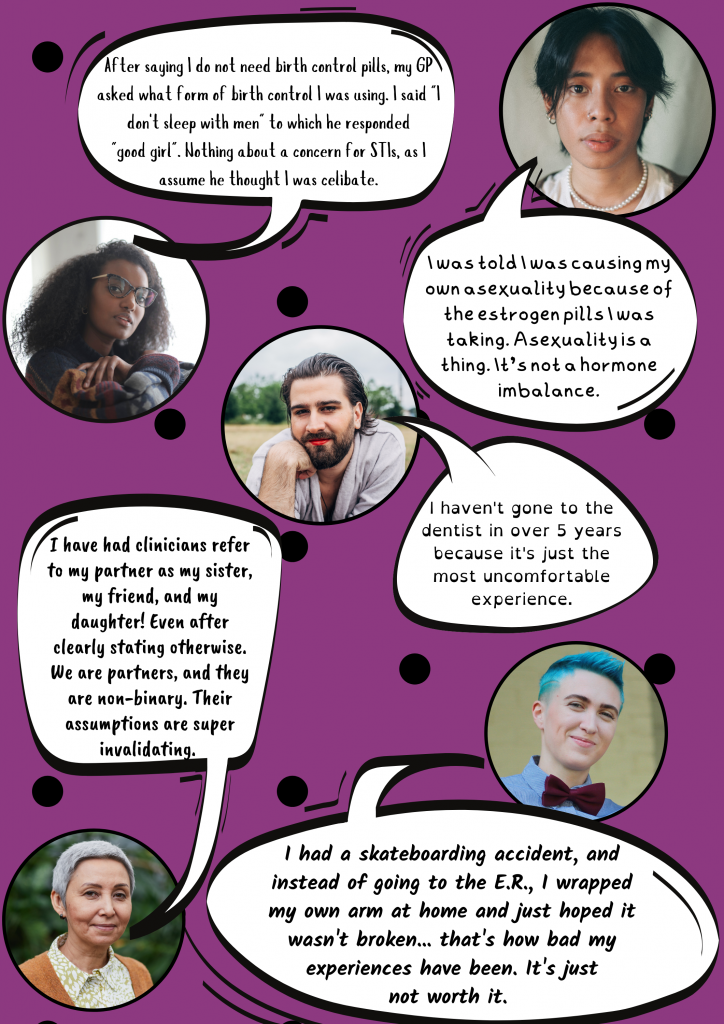Why 2SLGBTQ+ Health?
2SLGBTQ+ as a health disparity population
2-Spirit, lesbian, gay, bisexual, transgender, queer and questioning (2SLGBTQ+) individuals experience high rates of health disparities.
As a result of social stigma and discrimination, 2SLGBTQ+ people report higher rates of mental health challenges, anxiety, and depression:
- 2SLGBTQ+ youth are up to three times more likely to attempt suicide than their heterosexual, cisgender peers. In an Ontario-based study, 47% of trans people aged 16-24 recently considered suicide, and 19% had attempted suicide in the past year.
- Racialized 2SLGBTQ+ individuals have mental health needs nearly 5% higher compared to non-racialized 2SLGBTQ+ people.
- Due to the high burden of mental and emotional distress arising from the challenges and obstacles not experienced by heterosexual, cisgender population, coping behaviours that include tobacco, alcohol and drug use are more prominent in the 2SLGBTQ+ communities.
Transgender and non-binary people populations face many of the same health-related challenges that other members of the 2SLGBTQ+ community face, while experiencing greater barriers to social inclusion and higher rates of discrimination and stigma.
Health care providers have a role in identifying and addressing these disparities. The biases of medical providers encountered in health care settings can contribute to these disparities. Due to discrimination, harassment and barriers to equitable health services, 2SLGBTQ+ communities experience:
- higher rates of mental health concerns, including depression, anxiety and substance use;
- lower screening rates and higher rates of certain cancers and chronic conditions; and
- disproportionate rates of HIV among men who have sex with men and certain segments of the trans population. These rates are exacerbated by social and systemic issues such as HIV stigma, poverty, and anti-2SLGBTQ+ prejudice.
The barriers transgender people face in accessing necessary transition-related care and services are associated with poorer mental health and high rates of suicidality.
These stories are all too common, especially for trans and non-binary people. For more stories, take a look at the YouTube video below (5 minutes and 54 seconds). Although it depicts trans folks living in Oregon, their stories resonate with 2SLGBTQ+ individuals living in Canada and worldwide.
This video was created by the Oregonian, and copyright belongs to them. We have been made aware of a properly captioned version of this video made available through Amara.org (thank you, Cheryl Colan).
Media Attributions
- LGBTQ+ Health Quote Graphic © Ashlyne O'Neil is licensed under a CC BY-NC-SA (Attribution NonCommercial ShareAlike) license
a.k.a. Two-Spirit or Two-Spirited Person
(noun)
A term coined at the third annual intertribal Native American/First Nations Gay and Lesbian Conference in Winnipeg in 1990 which is used by Indigenous members of the 2SLGBTQ+ community. Although this English term is new, 2-Spirit people and teachings have existed within Indigenous culture since time immemorial.
2-Spirit is often described as meaning people who possess both masculine and feminine spirits, however it is used across Turtle Island to distinguish the Indigenous views of gender and sexuality from the Western gender binary violently imposed on Indigenous communities through colonialism. 2-Spirit is not a catch-all term for Indigenous people in the 2SLGBTQ+ community but may encompass individuals with various gender identities and sexual orientations. This term should only be used by Indigenous Peoples, and they must choose to adopt the term for themselves.
For more information: 2-Spirited People of the First Nations, Re:searching for LGBTQ2S+ Health, Canadian Encyclopedia
(noun)
a term used to describe a self-identified woman who is attracted to other self-identified women or feminine-aligning people.
(adjective)
a term typically used to describe a self-identified man who is attracted to other men or masculine-aligned people. This term can sometimes be used as an umbrella term for those who experience attraction to people of the same gender, but is not accepted as such by all members of the LGBTQ+ community.
(adjective)
a term used to describe a person who experiences attraction to two or more genders.
/ trans (adjective)
A person whose current sex/gender does not align with what they were assigned at birth. This is an umbrella term to describe the diverse ways that people can experience gender.
Transgender people, like cisgender people, can claim any identity in relation to their sexual/romantic orientation (for example, a transgender man may identify as heterosexual if they are primarily attracted to self-identified women and feminine people).
(adjective)
Often used as an umbrella term for the whole LGBTQ+ community, queer is used to describe someone who identifies as something other than heterosexual or cisgender. While it has been reclaimed by many, it should not be used to describe someone without their consent.
(adjective or verb)
this term has come to describe anyone who hasn't yet defined their sexual orientation, gender identity, gender expression, or some combination of the three. Using this term allows them to avoid labels while exploring themselves and belonging to the community.
2SLGBTQIA / LGBTQ2S+ / LGBTQ+ / LGBTTQQIAAP
Because there are so many identities that involve gender and sexuality, it is often challenging to select a word or acronym that makes everyone feel included.
2S: Two-Spirit (placed first to recognize the historical significance and role of 2-Spirited people)
L: Lesbian
G: Gay
B: Bisexual
T: Transgender
Q: Queer or Questioning
I: Intersex
A: Asexual
P: Pansexual
+ represents the recognition of various identities that may not be represented by current and historical labels
(adjective)
A term used to describe people whose current sex/gender aligns with what was externally assigned at birth. Essentially, anyone who is not transgender is cisgender.
(adjective)
An umbrella term used to describe those whose gender falls outside of the gender binary. Nonbinary people may identify as being both a man and a woman, somewhere in between, or as falling completely outside these categories. While many also identify as transgender, not all nonbinary people do.


